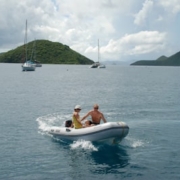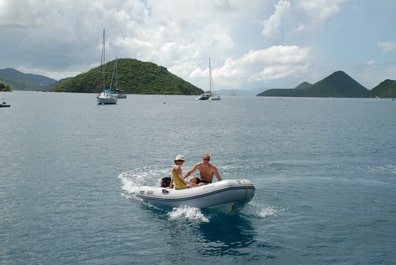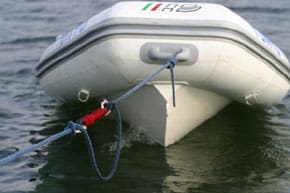Dinghy on a Bareboat Charter
Several things to note about the dinghy.
- First, like the fishing line out back, you’re going to forget about the dinghy and as soon as you throw the engine in reverse mooring, docking, or anchoring, you are going to chop up the dinghy painter and wrap it around the prop (The painter is the tow line attached to the front of the dinghy). Try to be one of the few captains who have never chopped up the dinghy painter while reversing the boat.
- If your dinghy motor keeps stalling when you put it in gear, you’ve probably got a line wrapped around its prop.
- Don’t think it’s a good idea to put the boat garbage into the dinghy. The bag WILL break and you’ll be cleaning up a nasty mess.
- Double check the locking clamp screws on the motor which attach it to the dinghy transom when you get your dinghy from the charter base and whenever you get in and out of the dinghy. Charter bases are constantly swapping out engines and they tend to forget this slight detail.
- Tow the dinghy about 20-30 feet back from the boat. If you have waves, adjust the length of the painter so that the dinghy is going up a wave when you are and down a wave when you are.
- Bail water out of the dinghy before you get underway. Water in the dinghy increases drag but also increases the chance of breaking the painter due to the increased force. You may not notice this for several miles and you’ll be paying for a dinghy and motor.
- Pull the dinghy up tight when you are anchoring and mooring to prevent the painter from being wrapped around your prop.
- Pull the dinghy alongside if you are doing any backing.
- Watch your elbows when you start the dinghy engine so that you’re not slamming one of your pretty crew members in the face. Train other crew members to watch their elbows if they start the engine.
- Don’t run the engine while the drive is out of the water. The impeller will burn out in a few seconds. Yes, dinghy engines have impellers too. Some dinghy engines are 4 stroke and require no oil mixed with the fuel some are two-stroke and do require oil mixed with the fuel. However, typically you’ll be given enough fuel to last your charter trip.
- Holding the dinghy sideways to waves on the beach will cause it to capsize. Face the bow into the waves.
- Don’t dinghy surf in rough weather. It’s been done, we regret it and it’s really dangerous.
- Train your crew on proper entry and exit techniques. IE it’s like rock climbing there should always be – two hands and one foot or – two feet and one hand touching something whilst getting into the dinghy (and a drink does not count).
- Train the crew on how to properly tie on the dinghy. You’ll be surprised at the number of people who can not tie a cleat hitch.
- Let others captain the dinghy. It’s fun and they want to do it.
Shockles are cool things to use to prevent jerking the dinghy painter in waves. They are an oversized and really tough bungee cord specially designed for this task. You can get them at https://www.davisinstruments.com/collections/marine-1/marine-product-line_shockles
Watch this video on operating a dinghy. On a sailing vacation, everyone wants to operate the dinghy, especially kids. And, it is a good idea. So don’t hog the dinghy operations for yourself. Let others use it. However, make sure everyone is operating the dinghy safely and with proper safety knowledge with supervision for the kids. Have your crew watch this video before your sailing vacation. It will prevent injuries and ensure everyone has a much better time.
The Dinghy Davit
You will find that the dinghy davit lines will tangle and twist so that it makes it impossible to raise the dinghy all the way up on the davit. Here is a short video showing how to untwist the davit lines. We shot this on our flotilla trip in Croatia.








